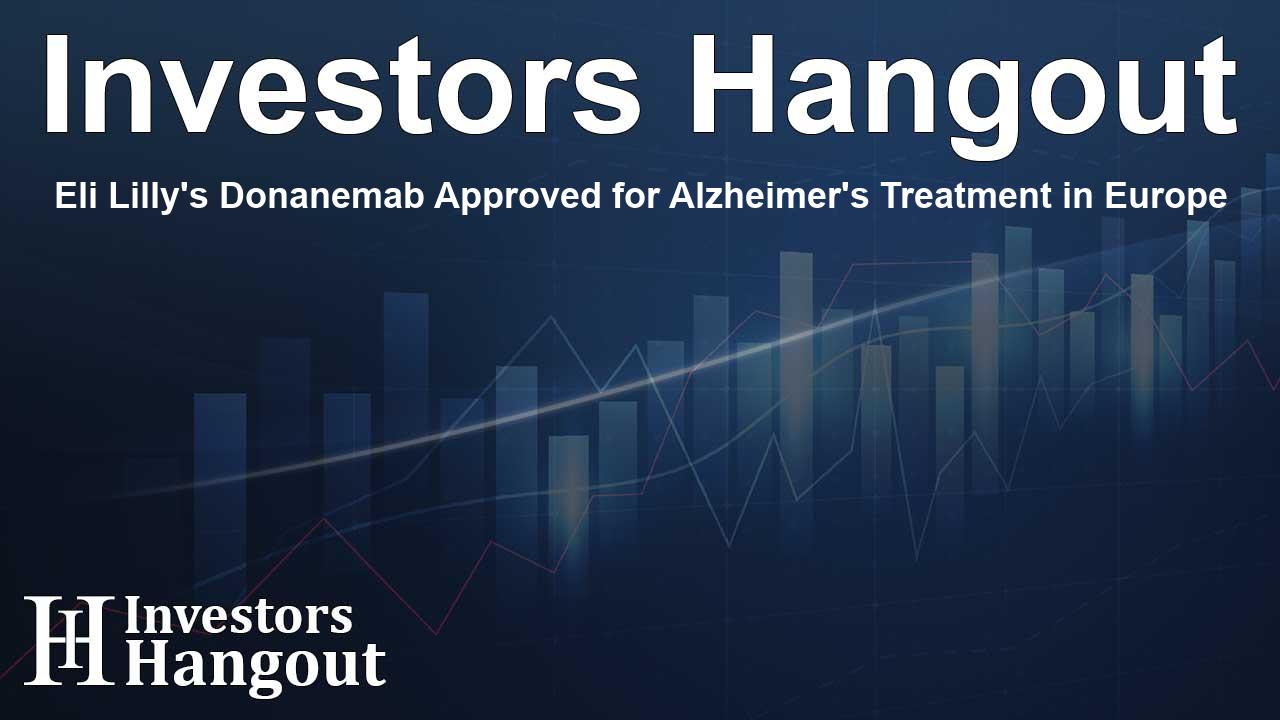Eli Lilly's Donanemab Approved for Alzheimer's Treatment in Europe

Eli Lilly's Promising Step Forward with Kisunla
Eli Lilly and Company has reached an important milestone by obtaining marketing authorization for Kisunla (donanemab) to treat early symptomatic Alzheimer's disease in adults. This approval by the European Commission signifies a major advancement in addressing this complex and challenging condition.
Significant Clinical Findings
In clinical trials, Kisunla has shown a remarkable ability to slow down cognitive and functional decline among individuals diagnosed with early symptomatic Alzheimer's disease. Specifically, patients experiencing mild cognitive impairment or mild dementia stages associated with Alzheimer's can benefit from this innovative treatment. Eli Lilly's Phase 3 TRAILBLAZER-ALZ 2 study revealed that earlier intervention with Kisunla leads to better clinical outcomes.
Patrik Jonsson, the executive vice president and president of Lilly International, stressed that early identification and treatment can significantly enhance the response rates to Kisunla. This potential for improved treatment outcomes presents fresh hope for patients navigating the challenges of Alzheimer’s illness.
Amyloid Plaques and Their Impact
The presence of amyloid plaques—abnormal clusters of proteins in the brain—plays a significant role in the progression of Alzheimer’s disease. Kisunla operates by targeting these amyloid plaques, assisting the body in diminishing their concentrations. Lessening amyloid levels may help maintain crucial cognitive functions such as memory and daily decision-making, which can greatly enhance the quality of life for those affected.
This once-monthly treatment sets itself apart as the only therapy with sufficient evidence supporting the completion of the treatment course once amyloid levels dip to minimal thresholds. Such innovative dosing not only aims to lessen the frequent burden of infusions but also presents potential cost savings.
The Growing Alzheimer’s Epidemic
With Alzheimer’s disease affecting nearly 6.9 million people in Europe, the urgency for early detection and treatment escalates. Statistics indicate that without timely intervention, one-third of individuals in the precursory symptomatic stages may progress to advanced stages within just a year. The aging population continues to amplify this need, reflecting an impending burden as the figure is expected to rise dramatically towards 2050.
Research Backing Kisunla's Authorization
The strides made in securing Kisunla's marketing authorization are grounded in robust data from clinical trials, particularly the TRAILBLAZER-ALZ 2 and TRAILBLAZER-ALZ 6 studies. These investigations have furnished clear evidence of Kisunla’s ability to alleviate cognitive decline, thus enhancing the well-being of participants requiring assistance with daily activities.
Nonetheless, potential side effects such as amyloid-related imaging abnormalities (ARIA) need to be monitored. These instances can occur without symptoms but may lead to serious health concerns in some patients, particularly those with specific genetic predispositions. Continuous dialogue with healthcare providers remains crucial for managing these risks.
A Comprehensive Treatment Approach
Kisunla operates through a well-delineated treatment plan, administered as an intravenous infusion once every month. Each session lasts approximately thirty minutes, designed to integrate seamlessly into the patient’s routine. As awareness of Alzheimer's disease continues to grow, so too does the need for healthcare systems to adapt to provide effective treatment pathways.
As it stands, Lilly is engaged in a series of ongoing clinical studies, expanding exploration into its efficacy for preclinical stages of Alzheimer’s as well. Efforts like TRAILBLAZER-ALZ 3 aim to evaluate Kisunla’s impact on individuals potentially at risk, while additional trials, including TRAILBLAZER-ALZ 5, focus on expanding its accessibility in various regions.
About Eli Lilly
Eli Lilly and Company has established itself as a pioneer in biopharmaceuticals, focused on transforming lives by tapping into the power of scientific research. The company works tirelessly to advance treatment options across various therapeutic areas, including Alzheimer's disease. With a commitment to innovation and patient-centric solutions, Eli Lilly stands at the forefront of addressing global health needs.
Frequently Asked Questions
What is Kisunla used for?
Kisunla is designed for the treatment of early symptomatic Alzheimer's disease, including individuals with mild cognitive impairment and mild dementia.
How does Kisunla work?
Kisunla targets and helps to reduce the accumulation of amyloid plaques in the brain, potentially slowing cognitive decline.
How often is Kisunla administered?
Kisunla is administered as an intravenous infusion once every four weeks.
What are the potential side effects of Kisunla?
Some potential side effects include ARIA, which can have serious implications, and specific allergic reactions.
Why is early treatment important in Alzheimer's disease?
Early treatment can significantly improve outcomes and potentially slow the progression of cognitive decline in patients diagnosed with Alzheimer's disease.
About The Author
Contact Owen Jenkins privately here. Or send an email with ATTN: Owen Jenkins as the subject to contact@investorshangout.com.
About Investors Hangout
Investors Hangout is a leading online stock forum for financial discussion and learning, offering a wide range of free tools and resources. It draws in traders of all levels, who exchange market knowledge, investigate trading tactics, and keep an eye on industry developments in real time. Featuring financial articles, stock message boards, quotes, charts, company profiles, and live news updates. Through cooperative learning and a wealth of informational resources, it helps users from novices creating their first portfolios to experts honing their techniques. Join Investors Hangout today: https://investorshangout.com/
The content of this article is based on factual, publicly available information and does not represent legal, financial, or investment advice. Investors Hangout does not offer financial advice, and the author is not a licensed financial advisor. Consult a qualified advisor before making any financial or investment decisions based on this article. This article should not be considered advice to purchase, sell, or hold any securities or other investments. If any of the material provided here is inaccurate, please contact us for corrections.
